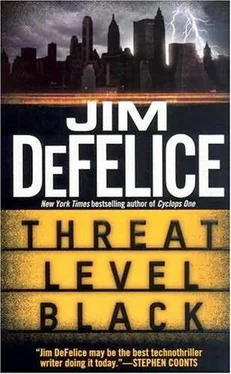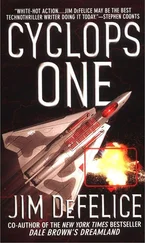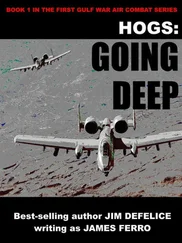The communications man tapped him. Tyler cupped his hand over his ear and then clicked into the circuit, talking into the miniature boom mike that extended near his collar.
“Etha bleekah,” he said. It was a transliteration of 3mo 6u3ko, Russian for It’s nearby. While the odds against the radio signal being intercepted were practically nil, they had decided to use Russian code words unless there was a problem. The phrase was arbitrary, intended to tell the controller that everything was clear but that the Korean had not yet arrived.
“Da,” responded the controller. Yes.
Howe was on schedule. All they needed was their package.
The communications man tapped him, then held up two fingers.
Team Two had the Korean in sight.
Tyler moved across the rise to a spot overlooking the road, careful not to stand upright where he would risk being silhouetted in the moonlight.
The man was alone, riding a bike.
He went back to the communications sergeant, who was handling the team’s twenty-pound radio, a modern version of the Raytheon AN/PSC-5(V). The radioman could select satellite, line- of-sight, UHF, and VHF frequencies.
“Eh-ehta harasho,” Tyler said into the mike, stuttering as he tried to pronounce the words 3mo xopowo: It’s all right, we’re cool, let’s kick butt, let’s go, let’s go, let’s go.
He pulled off his headset, straining to hear the hum of a jet in the distance.
Howe stood on the brakes as he touched down, the aircraft like a fully loaded tractor-trailer trying to grab the last spot in the Wal-Mart parking lot fresh off the Interstate. Short-landing characteristics were one thing; fitting yourself onto a postage stamp was something else again. The aircraft drifted to the right as he rode down the hard-packed runway; he pushed his whole body gently as he worked the stick, centering the aircraft with as much an act of will as muscle. Shadows flicked across his path; the g forces pinning him back to the seat suddenly eased, and one of the hangar buildings loomed on the left.
And then he saw the battery-powered lights the Air Force special operators had set to mark the edge of the runway.
He was in.
In.
Howe had just enough room and momentum to turn the S-37/B around at the end of the runway. As he did so, he popped the double canopy open and stared back at the shadows near the buildings. The lights told him that the air commandos and their Army brethren were all around him; all he had to do was sit and wait.
He had a pistol in his survival vest. He reached for it, pulling it out: It was a Makarov, in keeping with his cover, bulky and somewhat awkward, especially compared to his service Beretta, but it was reassuring nonetheless. He put the gun into his lap, holding it there, not wanting to scare the Korean off but not wanting to be caught unarmed either.
Belatedly, Howe pushed the timer button on his wristwatch, counting down his idle time. The buzzer would ring after ten minutes, but he’d already decided he would wait now as long as it took.
Four minutes had drained from the face of the clock when a figure appeared less than ten yards from the front of the plane. He had a gun in his hand; Howe involuntarily winced, bringing his own pistol up.
“American?” shouted the figure.
He ran to the side of the plane as Howe got out of the cockpit. The gun he held was a pistol-a revolver, Howe thought, from the shadow of the long barrel.
“American?” the man repeated. The accent had the hip-hop sound of a native Asian speaker, where tonal variations played an important role in meaning. “American?”
He pointed the pistol at Howe. Howe realized he was pointing back.
They had not set a password: How many jets would be appearing at this base; how many lone men would just happen to be close to it?
“American?” asked the man again.
“Yeah,” said Howe.
By now the Korean was looking for a handhold. Howe reached down and pulled the man onto the front winglet. The Korean threw a small bag into the backseat, then reached to climb in.
“The bomb,” yelled Howe. “Is the bomb here?”
“No bomb,” shouted the Korean.
“Where is it?”
The man said something, but between the sound of the jet engines beneath them and the man’s accent, it was impossible to understand.
“Snap on your restraints,” said Howe. The Korean fumbled with the helmet; Howe pushed it over his ears, then made the connections. He checked the seat restraints and started back for his cockpit when he thought of something else.
“Your gun,” he told the Korean, though there was no way the man could hear with the helmet on.
Howe reached over and grabbed for it; the man slapped his hand on Howe’s.
“No,” said Howe, shaking his head. “I get it.”
The Korean didn’t let go. Howe reached and took his own weapon; he thought of threatening the Korean but then thought of something better: He threw it down toward the ground.
Finally the Korean let go of his hand. Howe tossed the weapon down.
“Let’s get the hell out of here,” he said, going forward and climbing in.
Tyler saw the vehicle before anyone else did.
“Take him,” he said over the discrete-burst short-range com system that connected him with the men guarding the approach.
As he gave the order, the jet engines kicked up several notches on the field below, the plane roaring from the runway.
Belatedly, Tyler realized he had made a mistake. The truck was too far away to see the plane.
“Wait!” he yelled.
But it was too late: A Russian-made RPG grenade fired by one of his men blew through the windshield of the truck and exploded. A second later the rest of the team peppered its occupants with fire from their AK-47s.
“Shit,” said Tyler.
“Major?” asked the warrant officer in charge of the team that had just destroyed the truck.
“My fuckup,” said Tyler. “Make sure they’re dead, then let’s see what we can do about getting rid of the truck.”
Like the Russian design it had been based on, the S-37/B had special rough-field grates that helped keep debris and other nasties from shredding the engines on takeoff. Something big cracked against one of them as the Berkut built speed; Howe felt the shock but pressed on, committed to taking off both by momentum and situation. He had his nose up but his wheels still on the ground: Air-speed wasn’t building quite as fast as he expected. Something rumbled to his right and he held on, more Newton ’s passenger than his own.
The Berkut stuttered, then lifted freely.
He cleaned his gear and felt another rumble.
He was losing the right engine.
Howe’s hands flew around the cockpit even as his mind sorted out the situation. Something had smacked against one of the louvers and sent bits of metal or debris into the right power plant. It couldn’t have been much-the engine still wanted to work-but he could see the oil pressure shooting toward red and the power plant’s output sliding.
Like most jets, the Berkut had been designed to operate on one engine, and now that he was off the field with a relatively light load, he’d dodged the worst of the situation. Even so, flying with one engine meant changing his flight plan. The nap-of-the-earth route out required good reserve thrust; there were several points where he’d have to pull the nose up and make like a pole vaulter, squeaking over obstacles, just not doable on one engine.
He could go directly south, but that path bordered on suicide. Better to take it higher and round off some of the edges. He had the Russian ID gear, darkness, and, if all else failed, the cannon.
Читать дальше












